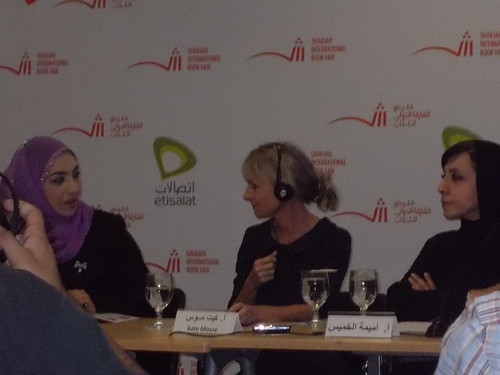
(L-R Mounia Bournat, Kate Mosse, Oumaima Abdullah al-Khamis)
Yesterday I saw a fabulous panel at Sharjah International Book Fair, The Woman’s Voice in Fiction – Global Perspectives. Although I was thrilled that women got a panel this year (yay!), I can’t help that women were more dispersed throughout the program rather being ghettoised into ‘women’s events’. However, the room was packed with a diverse audience of men and women, which is great.
The panellists were intelligent and inspiring female writers, including Oumaima Abdullah al-Khamis (Saudi Arabia), Dr Ahdaf Suwaif (Egypt), Kate Mosse (England), Shobha De (India) and Emirati moderator Mounia Bournat. So much to say that I’ll make multiple posts.
Both Kate Mosse and Oumaima al-Khamis spoke about women and history. I can only paraphrase the translation of Oumaima:
We know that in history a spokesperson is usually masculine. When a women talks about these things she is rebuilding the history in a different manner. She is showing the world from the perspective of women.
Kate Mosse went into greater detail:
Most of us do not like to be described as ‘women novellists’, but there is a truth that there are sometimes different issues that you want to cover in your writing as a woman.
Women’s histories haven’t necessarily found their way into the history books. I feel a political responsibility to tell the missing pieces of women’s histories.
Yesterday I wrote about truth in crime writing, and similar sentiments were really resonating at the women’s fiction panel.
Kate Mosse in particular spoke about the power of genre writing to reach people, and make a difference. “I write novels that are page turning novels,” she said. “They are not literature, they are powerful and fast-moving.”
It is almost impossible to describe to people of privilege how frustrating it feels to be oppressed, to be written out of history, and to have no literary role models to identify with. The importance of fiction, and writing in general, that features women cannot be understated. This is particularly striking when looking at the cultural makeup of the panel. The world is filled with white Western male heros; the importance of representing diversity as well as gender in literature is vital.
Both Oumaima and Kate spoke about their strong female characters, and how they write to transcend the domestic. Kate in particular made me smile when talking about her female protagonists:
I wanted to write novels with the women in the lead. Women doing things, women telling the stories. All my women are young women, because I feel young women are brave. A young female narrator is a very powerful tool.
Kate’s books are all about women having adventures, they are not stories about women finding husbands. BUT WOMEN DON’T HAVE ADVENTURES, I hear you scream. Well, this is what you may think if you peruse the shelves of your local bookstore. I have blogged before about the lack of women’s adventure travel writing, but let me assure you, women are out there having incredible adventures. I would like to see more literature reflect this, both in fiction and non.
(Aside: I urge you to check out Scottish author Sarah Sheridan, another writer here at SHJIBF, who also writes fiction that features female protagonists having adventures throughout history.)
Finally, I loved what Oumaima said about the open-ended conclusion of her novel:
(It has) no conclusion; no happy ending, no apocolyptic ending. It was open for readers to decide, because novels introduce new ideas before reaching to further horizons.
I like the idea that these books, although empowering to women, are not necessarily happily-ever-after stories, and reflect the complexities of life itself. Things may get better, they may get worse, but we will keep on moving forward however we can.

No comments:
Post a Comment